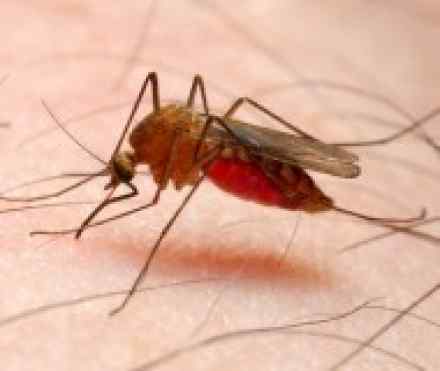
What is it?
Malaria is an infectious disease caused by a parasite that's transmitted by mosquitoes. The illness results in recurrent attacks of chills and fever, and it can be deadly.
Malaria has been virtually eradicated in countries with temperate climates, but it's still prevalent in tropical and subtropical countries in Africa, Asia, the Middle East, South America and Central America. Malaria remains one of the world's leading infectious killers, particularly of children in sub-Saharan Africa.
Most cases of malaria develop in travelers who have recently returned from parts of the world where malaria is widespread, particularly Africa and India. If you're traveling to malaria-endemic places, take precautions before, during and after your trip. Treatment for malaria is with antimalarial drugs.
Symptoms
A malaria infection is generally characterized by recurrent attacks with the following signs and symptoms:
- Moderate to severe shaking chills
- High fever
- Profuse sweating as body temperature falls
- General feeling of unease and discomfort (malaise)
Other signs and symptoms include:
Causes
Evolving strains of drug-resistant parasites and insecticide-resistant mosquitoes continue to make malaria a global health problem.
A one-celled parasite, plasmodium, causes malaria. About 170 species of plasmodium exist, but only four cause malaria in humans:
- P. falciparum. This species, predominant in Africa, produces the most severe symptoms and is responsible for most malaria deaths.
- P. vivax. This species, found mostly in tropical areas of Asia, produces less severe symptoms but can remain in your liver and cause relapses for up to four years.
- P. malariae. This species, found in Africa, can cause typical malaria symptoms, but on rare occasions it can remain in your bloodstream for years without producing symptoms. In these cases, you may pass on the parasite to a mosquito or to another person through a blood transfusion.
- P. ovale. This species is found mostly in West Africa. Although rare, it can also remain in your liver and cause relapses for up to four years.
The process of transmission
The transmitter (vector) of the plasmodium parasite to humans is a female anopheles mosquito. When a mosquito bites a person infected with malaria, it ingests a form of the parasite called gametocytes. The plasmodium completes part of its life cycle inside the mosquito, eventually making its way to the mosquito's salivary glands. Then, when the mosquito bites you, it injects the parasite into your bloodstream.
The parasite migrates rapidly to your liver, where it infects certain liver cells and develops for a week or so. The liver cells eventually burst, releasing a multiplied form of the infection into your bloodstream. Once in your red blood cells, the parasites reproduce further and some develop into the form that's available to be ingested by a mosquito (gametocytes), thus renewing the transmission cycle. In some cases of P. vivax or P. ovale infection, a form of the parasite can remain inactive in the liver for extended periods of time. Later, reactivation of the parasite's life cycle causes a relapse.
Other means of transmission
A pregnant woman can transmit the infection to her unborn baby. Malaria also can be transmitted through blood transfusions. In the United States, steps have been taken to prevent this type of transmission. People who have been in a malaria-endemic area are prohibited from donating blood for a year after returning from such an area, or three years if they've been a resident of a malaria-endemic area or have been treated for malaria.
Risk factors
People who have little or no immunity to malaria are most at risk for serious illness. Residents of a malaria region may acquire some immunity to the disease during their lifetime, but those who haven't yet acquired immunity are at risk. People at increased risk for serious disease include:
- Young children and infants
- Travelers coming from areas with no malaria
- Pregnant women and their unborn children
Poverty, lack of knowledge, and little or no access to health care also contribute to malaria deaths worldwide.
It's also possible to lose your immunity if you're no longer frequently exposed to the parasite. So even if you've previously lived in a region where malaria exists, take antimalarial precautions if you return to such an area after an extended period away.
Complications
Most serious complications of malaria are associated with infection by P. falciparum. Among the complications are:
- Anaemia. This can result from extensive destruction of red blood cells.
- Cerebral malaria. If parasite-filled blood cells block small blood vessels to your brain (cerebral malaria), swelling of your brain or brain damage may occur.
Other complications may include:
- Breathing problems, at times severe in the form of accumulated fluid in your lungs (pulmonary oedema)
- Dehydration
- Liver failure
- Kidney failure
- Enlarged spleen
If untreated, P. falciparum malaria can be fatal within a matter of hours.
Diagnosis
After noting your symptoms and travel history, your doctor will likely obtain a sample (smear) of your blood for observation under a microscope. Two blood samples, taken at six- and 12-hour intervals, can usually confirm the presence of the malaria parasite and its type.
References
https://www.hse.ie/eng/health/az/M/Malaria/Treating-malaria-.html
http://www.who.int/malaria/areas/treatment/en/
http://www.webmd.com/a-to-z-guides/malaria-medications
http://www.drugs.com/health-guide/malaria.html

